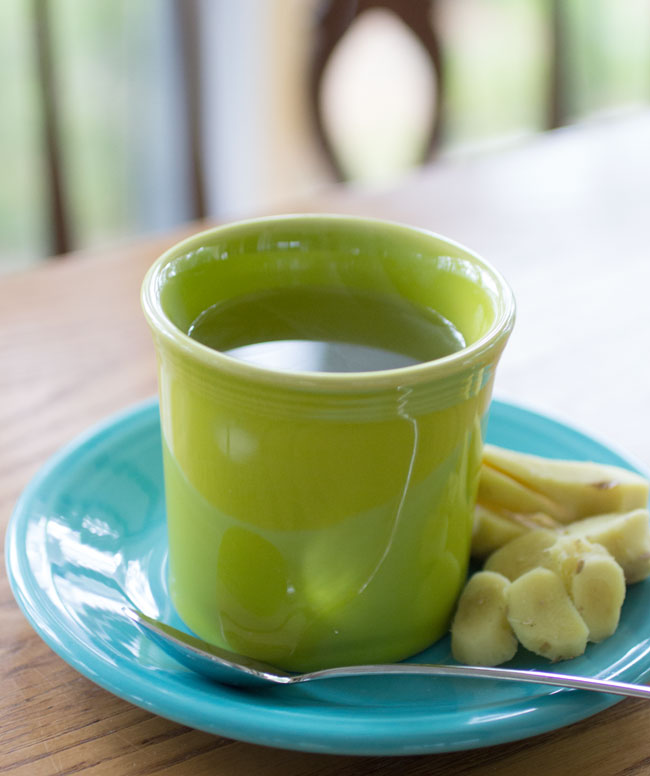There is something about the simple act of holding a mug of tea that is healing. From the steam whisking up off the surface to the herbal aromas and warmth created between the hands, the experience of tea time is inherently comforting to the soul. Add to this the health benefits of ingredients like ginger, and tea can be a very powerful medicine for the body as well. This fresh ginger tea can be used to soothe an upset tummy and ease the symptoms of a cold, allergies or the flu. It is also the ideal thing to cozy up with at the end of a long day, especially as the temperatures start to drop and dusk falls earlier with each passing evening.
It has long been known that when consumed, ginger works to balance the immune system, soothe the digestive tract and calm inflammation in the body. References to ginger appear in early Sanskrit and Chinese texts as well as ancient Greek, Roman, and Arabic medical literature. As we discussed in this recent post, modern science has revealed that the active components of the ginger root are volatile oils and concentrated phenol compounds, such as gingerols and shogaols. Together these compounds help to support over 40 different pharmacological actions in the body.
As a review, the key medicinal properties of ginger include:
- Anti-inflammatory
- Antibacterial, Antiviral, Antifungal
- Blood Sugar Regulator
- Antioxidant Rich
- Digestive Aid, Antispasmodic
The active constituents of ginger are found in abundance in the yellow flesh of the ginger rhizome or root. Raw ginger has a very spicy and pungent flavor however, which is softened and sweetened when cooked. Research has also shown that while some of the compounds will change when heated, ginger's major therapeutic effects are not lost when prepared in this way. Making a tea from the fresh root is therefore one of the most simple, effective and delicious ways to reap the health benefits of this time-tested botanical.
Among other things, fresh ginger tea has been found useful to:
- Help prevent colds and viruses
- Ease flu-like symptoms
- Treat respiratory tract infections and coughs
- Enhance digestion
- Provide relief from diarrhea and gas
- Regulate appetite and carbohydrate metabolism
- Alleviate nausea and motion sickness
- Quell morning sickness
- Relieve muscle and/or joint soreness
Pre-packaged dried teas can certainly be helpful and convenient too, but nothing quite matches homemade ginger tea in nutrient richness and taste. There are many recipes for homemade ginger teas out there, but I have found that the one below works the best for me.
This may seem obvious to some of you, but I think it is also important to mention that filtered water is crucial to making successful teas. The chlorine and other chemical disinfectants that are typically added to municipal water supplies can meddle with the botanical compounds if not removed beforehand. Plus your tea will taste much better if the water is pure!
Homemade Fresh Ginger Tea
By Kayla- Radiant Life
Ingredients
2 inch piece of ginger
6 cups filtered water
1 tablespoon raw honey, optional
Directions
Heat water on high in a large kettle or pot on the stove.
In the meantime, peel and finely mince the ginger (I recommend peeling ginger with the back of a spoon as shown in this post). This should yield about 2-3 tablespoons of minced ginger.
Once the water has reached a boil, remove from heat and add the ginger. Cover and let sit for 5-10 minutes. The longer the tea is allowed to sit, the stronger the flavor will be. Stir in honey when tea has reached desired strength.
For hot tea, strain directly into teacups or mugs. For iced, let cool and strain into a pitcher, cover and refrigerate. Enjoy!
* For a single serving reduce to 2 cups of water and approximately 1 tablespoon of minced ginger steeped for 5 minutes.

